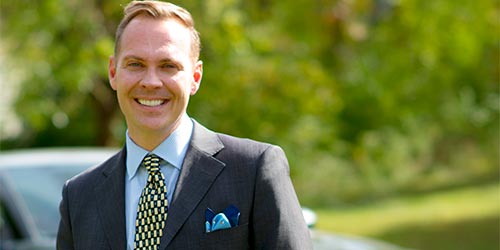By Christopher Treacy

Travis Parman predicted the future.
As the current director of Corporate Communications at Nissan, Parman oversees all sorts of relationships within the automotive industry. But it wasn't that long ago that he wrote a 333-page thesis for his master's degree that specifically examined the relationship between corporations, their media marketing strategies and the LGBT community at large. The deep level of understanding it demonstrates makes Parman a wet-dream ally for nearly any niche marketing scheme – and so far, his thesis speaks the truth.
"What my thesis predicted was a mainstreaming of LGBT marketing, media and PR outreach efforts," he says in a Southern drawl befitting his native Tennessee homeland (Parman splits his time between Nashville and Bloomfield Township). "And that's exactly what's happened, but there are two distinct parts to the history. The mid-2000s were a heyday for LGBT marketing and PR. Interest was surging; it was new, novel and sexy. And that was right before the recession. During a recession, marketing to diversities is the first thing that gets cut from the budget. All of the industries saw a retraction, so it's different now than it was."
Prior to his role at Nissan, Parman put his expertise to work at General Motors. It was during that time that he began working on his thesis, in part because of what he was learning from helping GM more effectively target specific audiences.
"At General Motors, we had a Diversity Communications Program," Parman explains. "So it wasn't really designed to address the LGBT community specifically, but rather, it attempted to reach all of the diversity groups: Hispanic, Asian, women, etc. The reality, however, is that you've got to separate it out: if you're trying to demonstrate understanding, lumping diversity groups together accomplishes the direct opposite. And when we started, that's what I was finding across the board."
Although never officially titled as such, Parman became an expert at LGBT-specific PR outreach within the automotive industry, moving from GM to Nissan while he completed his thesis. Along the way, he learned to put his own sexual orientation to work in a strategizing capacity – after all, who better to determine what gay people want from a corporation than someone who identifies as gay?
In his research, Parman, now 42, saw lots of companies attempting to court the gay dollar without achieving the proper credentials first … a strategy that wasn't working all that well since, as a community, we do our homework. Gays and lesbians are generally careful to make sure that the entities they support are first supporting them – simply making a play for our money won't get you very far.
"The community checks for things like domestic partnership benefits and how a company goes about supporting its LGBT employees, so you have to have your house in order first," Parman says. "Once you've established that, you have to further demonstrate that you actually understand the community you're targeting. I think of the mid-2000s as 'LGBT Outreach 1.0.' In the best case studies, they got the language and the imagery down, and the message would get delivered with a nod and a wink … things that straight audiences didn't even notice," he adds, recalling a conversation with someone from Cadillac's marketing department in which he tried to explain a Canadian Subaru ad that boasted the slogan, "We've Got Versatile Tops."
Demonstrating a high level of understanding to LGBT consumers is tricky, and Parman says that one way to get it done is by bringing a company's gay employees together with community leaders and politicians whenever possible, creating forums for dialogue specific to their issues. This goes far to show both influence and initiative.
Of course, another way to effectively engage the gays is to get involved with Pride.
Parman recalled the low-level presence he witnessed from Infinity – Nissan's luxury brand – during his early days with the company at Nashville Pride. Keep in mind that Nissan's American home base is in Tennessee, so Nashville's annual Pride celebration should be an important event for the company.
"Infinity had a couple of vehicles parked outside the gate with no staffing to talk about the cars," he says. "They just didn't know any better. I thought, 'Kudos to them for trying, but let's show you how to leverage what you already have.' This year, we pretty much owned Nashville Pride with over three dozen volunteers – we gave out Nissan towels at the misting stations."
Actually, Nissan has done a big 180 with regard to its LGBT relationship. This is thanks in large part to the implementation of "GSAN" – a Gay-Straight-Alliance diversity training program that, in the course of two years, took the company's HRC Corporate Equality Index from a shoddy 30 all the way up to 100. Rather than just having cars and volunteers at Nashville Pride this year, Nissan was a sponsor. And Parman says they held their own at Motor City Pride as well.
"We partnered with Affirmations and set up a speed-dating event using our cars," he says. "We supplied the questions as well, which demonstrated our level of comfort, knowledge and cultural fluency."
Parman says the tides have turned significantly since his days at GM, in many ways – but maybe not all – for the better. Mainstreaming sounds deceptively simple, but it's actually forcing companies to speak to consumers with broader strokes while still finding ways of letting diversity groups somehow know they're included in the message. Whereas so much of the targeting occurred "in-channel" – i.e., within niche publications and other media – now, consumers are addressed en masse.
"And we're also a more nuanced LGBT audience," he says. "We have an older generation that came of age without acceptance and have never been comfortable being marketed to. We have a middle-aged group that knew people affected by AIDS, which became a cohesive force that has bonded them together – they appreciate being recognized. And we have a younger group that came up with 'Will & Grace' already in syndication – they reject the notion that they should be spoken to in any specialized way.
"The advent of social media has changed everything, and one part of the mainstreaming phenomenon is that information now gets broadly shared – you can't keep it 'in-channel' anymore," Parman says. "And, of course, the general population is more sensitive to -and educated about – LGBT issues."
A Driving Force










